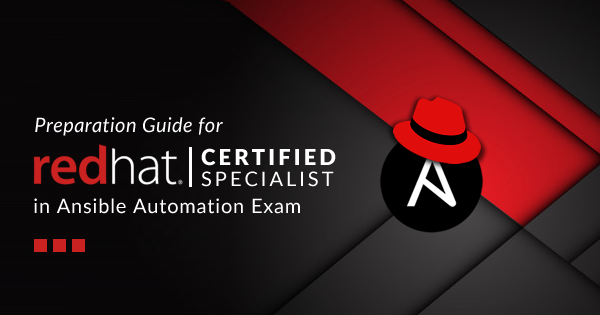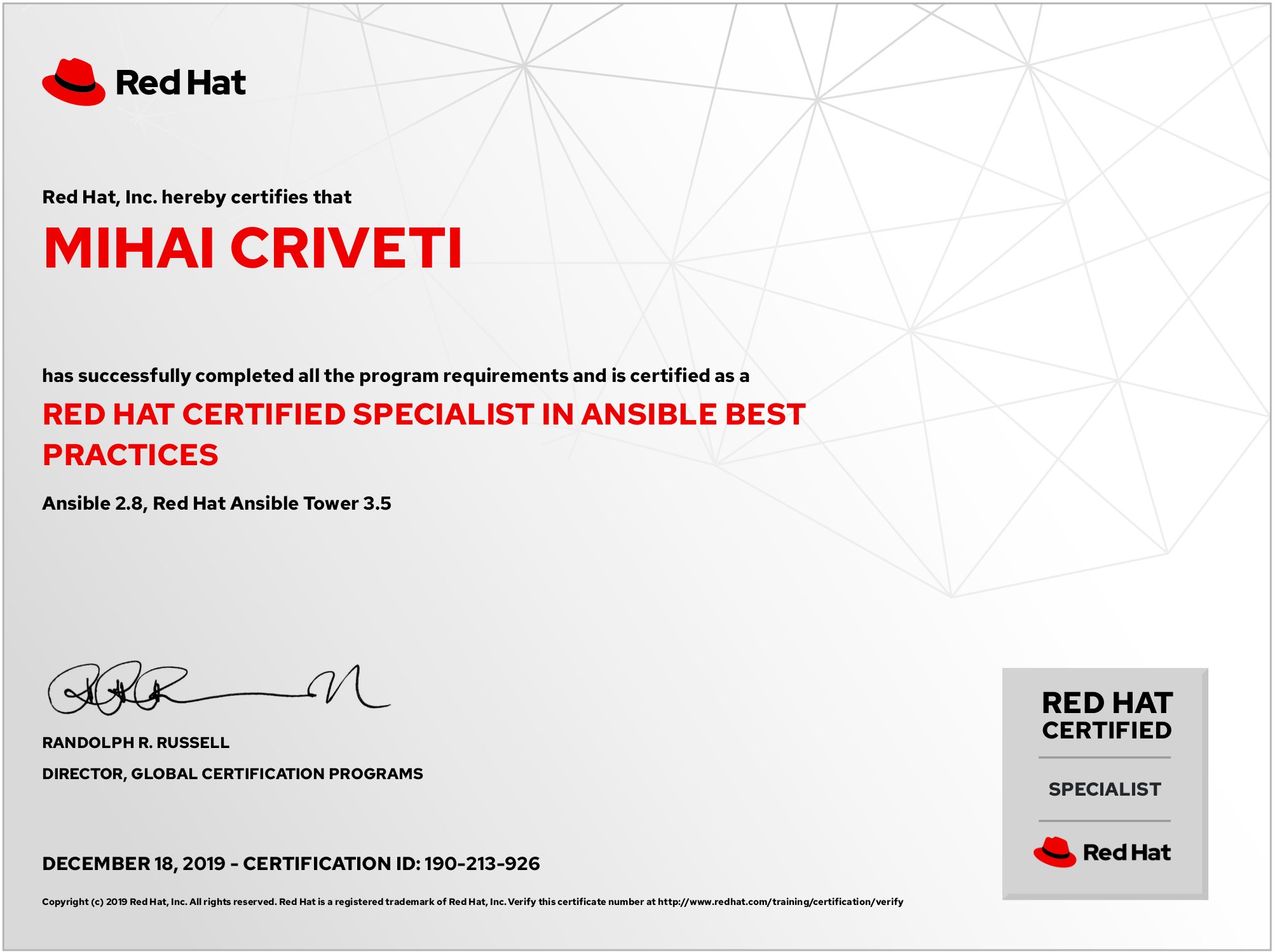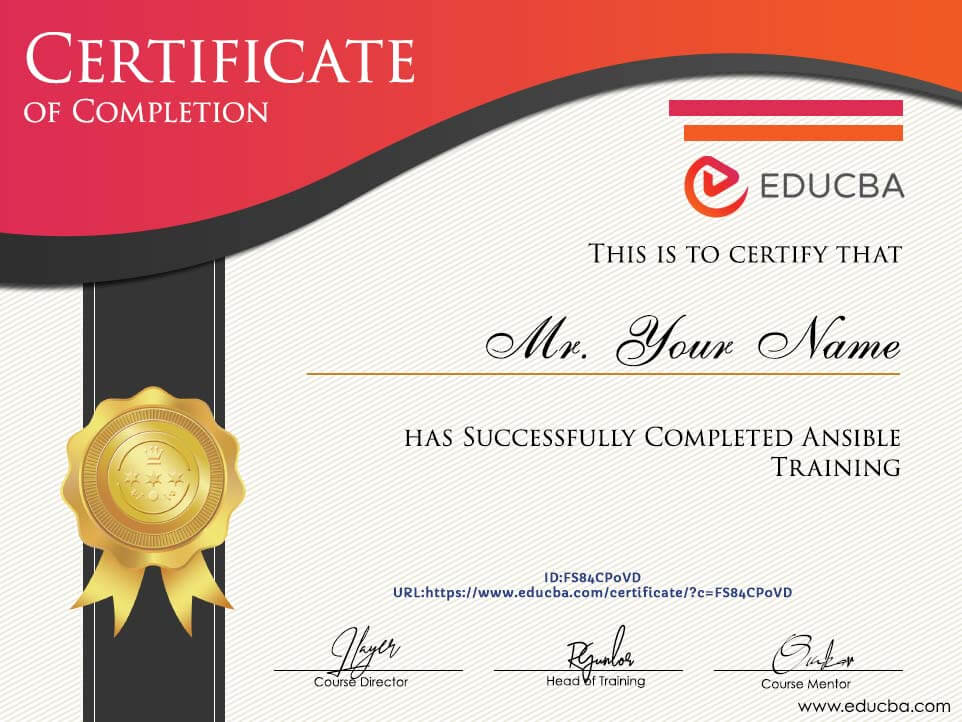Ansible Certification is a powerful tool for automation that helps developers save time and effort. It makes it easy to deploy applications to servers without writing code.
I don’t believe that Ansible certification is essential. However, I recommend taking the certification route to add value to your skill set.
Certification is a great idea; I’m glad you decided to go through it. It gives you a chance to show off your skills and expertise.
The certification process will also make it easier for you to land a job. This is especially true in the tech world, where companies often look for certifications to identify someone who knows what they’re talking about.
Ansible is one of the most powerful and flexible IT automation tools, which has gained popularity in recent years due to its ability to perform tasks without scripting. It can automate various tasks, including installing software, configuring servers, and deploying applications.
You should consider taking the certification exam if you’re interested in Ansible. This will help you prove your knowledge and earn some extra points.
Want to learn how to install, configure, and manage a Linux server? In this course, you’ll learn how to install, configure, and organize a Linux server using the Ansible configuration management tool.
With Ansible, you can easily automate tasks and configure servers, workstations, networks, and cloud environments. In this course, you’ll learn how to use Ansible to install, configure, and manage Linux servers.
You’ll start by installing Ubuntu and Ansible on your development computer. Then, you’ll learn how to deploy a simple Ansible playbook that installs and configures Ubuntu.
You’ll learn to set up a Linux server on your development computer using Vagrant, a virtual machine technology. Then, you’ll learn how to install, configure, and manage a CentOS server using Ansible.

Ansible Roles
As I mentioned in the introduction, there are many ways to make money online. But one of the most straightforward is taking advantage of the popularity of cloud computing.
It seems like everyone has an opinion on what’s best. But you don’t have to take my word for it. Just check out the top 10 cloud computing companies.
For example, to become an Amazon Web Services developer, you must first learn how to write code. This is usually done through one of the many online courses available.
The same goes for everything else.
But you can also get paid to test websites and apps. You’ll need to register with a website called Userlytics. Then, you’ll be sent out different tests. Some will be simple, while others will be more complex.
Once you complete a test, you’ll get paid for each test you pass. It can take a few days to get approved for the next round of tests.
Ansible is a Linux-based automation tool that allows users to set up and manage complex IT environments. It’s similar to Chef but designed to be easy to use and install.
The best thing about Ansible is that it’s easy to master and requires little to no upfront investment.
This means you can use it immediately to build your career and earn a higher salary.
Ansible Playbooks
There are some pretty cool benefits to being an Ansible-certified professional. For one, it means you have a credential that employers can use when looking for qualified workers.
But there are also plenty of other reasons to study Ansible, including being able to automate and scale your infrastructure in the future.
It’s also a good way to keep your skills sharp since there are always new things to learn. But, ultimately, the decision is yours.
So, I’m sure you’re wondering, is it worth it? Can you get some certification that will help you land a job?
The short answer is that the best way to land a job is to be known as an expert in your field. Having a skill that you can leverage to get a higher salary and have a portfolio of projects demonstrating your skills is a great way to get noticed by recruiters and hiring managers.

Playbook Structure
This is probably the most difficult test you’ll ever take. Ansible is a leading open-source automation tool companies worldwide have used to manage their infrastructure.
That being said, the Ansible Certification is a rigorous test. There are over 300 questions in this exam, and you only have 60 minutes to complete it.
Ansible is an open-source automation platform that helps IT professionals manage and orchestrate services like servers, desktops, and IoT devices.
While it has a steep learning curve, it’s perfect for beginners looking to become more self-sufficient with their IT infrastructure.
The world of IT automation is growing by leaps and bounds, and it will only keep growing as the industry continues to expand.
With all of the new technologies being created, there is no doubt that more and more people will be required to be able to maintain them. That means more jobs will be needed to support them.
To get hired by these companies, you’ll need to be able to automate your workflow. You’ll need to understand how to work with the tools used to automate the work.
This means you’ll need to go through some certification process. And since this field is growing quickly, you must get certified soon.
Frequently Asked Questions (FAQs)
Q: How can I prepare to take this exam?
A: This certification test consists of questions in multiple-choice and drag-and-drop formats. Each question has three answer choices. There are a total of 100 questions. The test is not timed, so time spent on each question is only counted as one point.
Q: How do I take the exam?
A: You can take the exam online or download it as an e-book.
Q: When does the exam take place?
A: The exam will be held twice yearly on Fridays and Saturdays at the same location. You must register in advance if you need to attend the live exam. If you choose to register for the live exam, there will be an additional fee.
Q: Do I need a laptop to take the exam?
A: Yes, you must bring your laptop,
Q: What is Ansible certification, and how can it help me?
A: Ansible is an orchestration tool that helps automate the configuration management of servers and applications in large-scale environments. You can use the Ansible platform to deploy and manage servers with minimal human interaction.
Q: Can someone learn Ansible and become certified?
A: Yes, anyone can learn Ansible, but there are different levels of certifications. A “Foundation” certificate is a step one certification. A “Professional” is a higher level of certification.
Q: What’s the difference between a Foundational Certificate and a Professional?
A: Foundational Certificates are like a foundation for professional certificates. For example, a Foundational Certificate is a prerequisite for the Professional Certificate in Ansible.
Q: Are the Foundational Certificates as hard as the Professional Certificates?
A: Yes.
Q: What are some key skills for working in the IT field?
A: IT is a broad term that includes everything from networking to programming. It has a lot of opportunities, and there is a lot to learn. I advise finding a job you love, studying what you like best, and knowing how to do that.
Q: What specific certifications do you recommend for people interested in being certified?
A: I would say the best thing is to familiarize myself with the material. That is the minimum requirement for almost any IT job these days. I think everyone should try to get their CCNA certification, at least.
Q: What do you know now that you wish you knew before taking the exam?
A: Before taking the exam, I did not realize how important the networking side was.

Myths About Ansible Certification
Ansible certification is the “gold standard” of IT skills.
Ansible certifications are not useful in finding jobs.
Ansible Certification is expensive.
It’s not difficult to get Ansible Certified.
You don’t need to take a test if you are already certified.
Conclusion
Ansible is a great tool for automating the deployment of server configurations. But it can be a little overwhelming for a beginner. It requires a lot of setup and some understanding of Linux administration to get going.
But the more you work with it, the more it will make sense. This is especially true if you can find people to help you.
Once you understand how it works, you can create playbooks that automate your deployments. And with the right network, you could eventually become a consultant or even a trainer.
Ansible is a great tool for the job if you want to automate server deployments. But it may not be the right fit for everyone. So, it depends on your interests.
Ansible has been called the Linux of DevOps. It’s a tool that automates the deployment of software packages and provides a consistent approach to deploying infrastructure.
Some say it is as powerful as Puppet and Chef combined. But I’ll tell you a little secret: You don’t need to become a certified Ansible administrator to make money with it.
That’s right, the same principles that drive it can be used to set up automated deployments for virtually anything.





